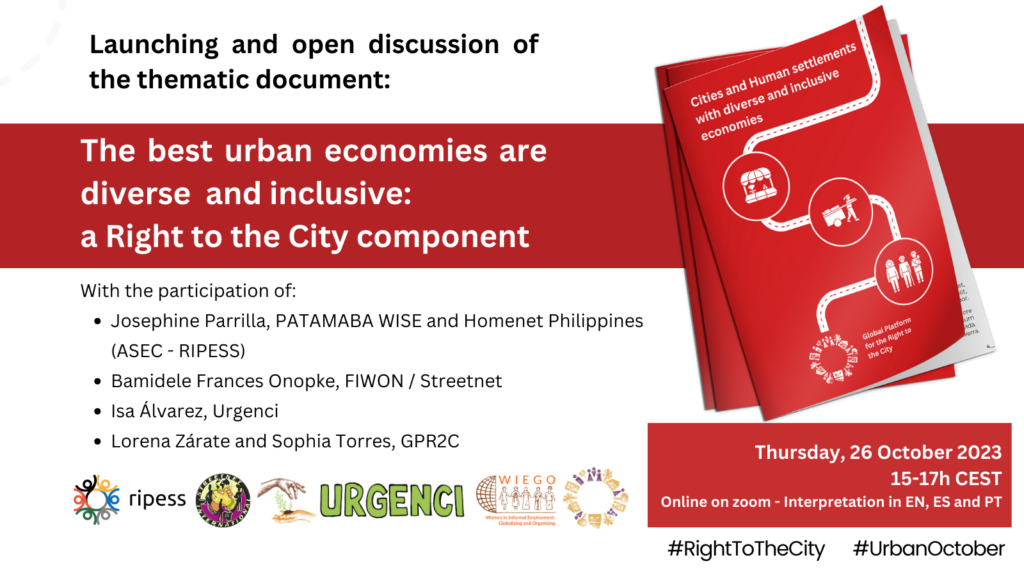Commemorative event on the occasion of the International Day of Care and Support
and the World Day for the Right to the City

The Global Platform for the Right to the City (GPR2C) has partnered with members RIPESS, Streetnet, WIEGO and Urgenci to develop a publication on “Cities and human settlements with diverse and inclusive economies”. The document seeks to further develop the role of diverse and inclusive economies, shedding light on alternative systems that guarantee decent livelihoods and work for all, contributing to the strengthening of community ties and care for the environment.
To mark the launch of the publication, the partners will be holding an online event on Thursday, October 26th, between 15h and 17h CEST (click here to check your local time). The event seeks to hold an open discussion on key pillars of diverse and inclusive economies under the Right to the City framework as portrayed in the publication, such as the Social and Solidarity Economy, the popular/informal economy and the care economy, identifying and discussing how to put forwards concrete actions at the local level to promote and leverage diverse and inclusive economies, and support those who drive them.
| The event will be held online and will count with interpretation in English, Spanish and Portuguese. |
Details and agenda |
The event will start with a panel where partners that have contributed to the publication will introduce some of the key points included in the text, through concrete experiences from the Social and Solidarity Economy, the popular/informal economy and the care economy. Moreover, panelists will touch upon core measures and incentives that can be put forward at the local level to support these economies and the actors driving them. Finally, the core of the event will be held around an open discussion spurred by the panel, with the participation of attendees as well as other guests representing international organizations, local governments, community organizations, academia and others.
Agenda |
|
| Introduction: Diverse and inclusive economies and the Right to the City | Sophia Torres, Global Platform for the Right to the City |
| Structuring elements to advance diverse and inclusive economies as a Right to the City component |
|
| Open discussion |
|
| Closing | Lorena Zárate, Global Platform for the Right to the City |
World Day for the Right to the City |
Both the publication and the launch event are held in the framework of the GPR2C’s campaign for Urban October and for the World Day for the Right to the City. As every year, October is a key month for visibilizing territorial struggles from a Right to the City perspective, through the confluence of a set of international commemorative days. Under the context of the official commemorations focused on “Resilient urban economies. Cities as drivers of growth and recovery” and on “financing sustainable urban future for all”, the GPR2C and partners seek to contribute to amplifying and diversifying the debate, through emphasizing the need for advancing towards economic models and systems that are founded on a rights-based solidarity approach, which leverage the social and economic function of common goods, putting the care for the people and the planet at the center.
That is why, the GPR2C is releasing the thematic brief and campaign on “Cities and human settlements with diverse and inclusive economies”, highlighting the role of this key component of the Right to the City approach. This also comes on the year in which the UN General Assembly approved a resolution providing recognition and support to the social and solidarity economy and 29th of October has been recently designated as the International Day of Care and Support, seeking to highlight the importance of the care economy and the need of improved recognition and support for those that take the leadership in developing care-related activities.




